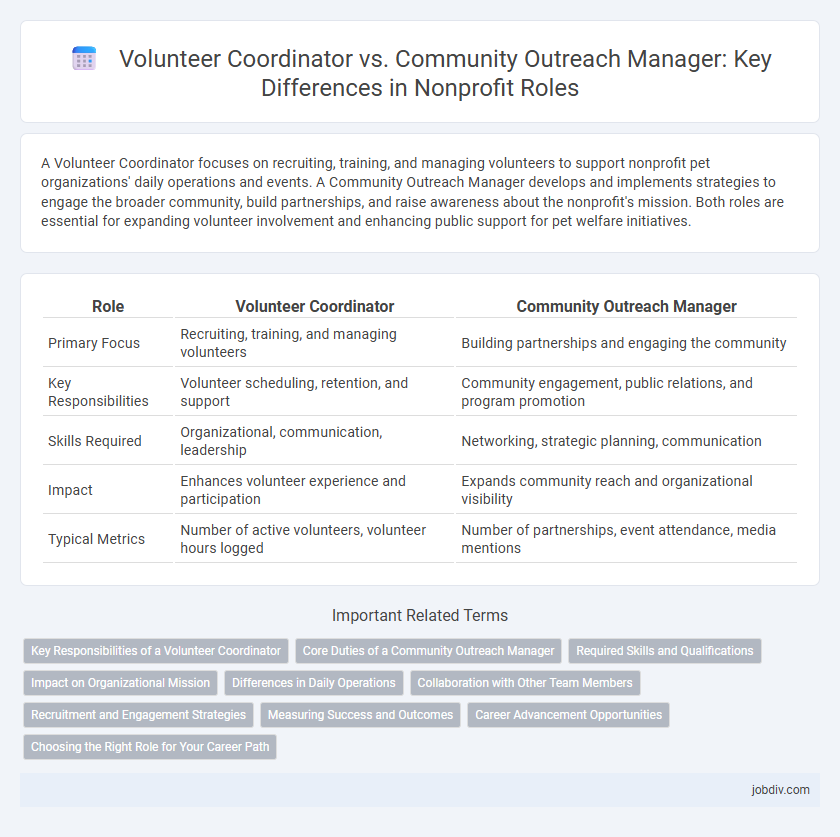A Volunteer Coordinator focuses on recruiting, training, and managing volunteers to support nonprofit pet organizations' daily operations and events. A Community Outreach Manager develops and implements strategies to engage the broader community, build partnerships, and raise awareness about the nonprofit's mission. Both roles are essential for expanding volunteer involvement and enhancing public support for pet welfare initiatives.
Table of Comparison
| Role | Volunteer Coordinator | Community Outreach Manager |
|---|---|---|
| Primary Focus | Recruiting, training, and managing volunteers | Building partnerships and engaging the community |
| Key Responsibilities | Volunteer scheduling, retention, and support | Community engagement, public relations, and program promotion |
| Skills Required | Organizational, communication, leadership | Networking, strategic planning, communication |
| Impact | Enhances volunteer experience and participation | Expands community reach and organizational visibility |
| Typical Metrics | Number of active volunteers, volunteer hours logged | Number of partnerships, event attendance, media mentions |
Key Responsibilities of a Volunteer Coordinator
A Volunteer Coordinator manages recruitment, training, and scheduling of volunteers to ensure seamless support for nonprofit programs. They maintain volunteer databases, track hours, and evaluate volunteer performance to maximize engagement and impact. Coordinators also foster communication between volunteers and staff, creating a positive and organized volunteer experience.
Core Duties of a Community Outreach Manager
Community Outreach Managers develop strategic partnerships, organize community events, and lead public awareness campaigns to enhance nonprofit visibility and engagement. They coordinate outreach efforts across diverse groups, monitor program impact, and manage relationships with stakeholders to ensure mission alignment. Their core duties include mobilizing volunteers, facilitating communication between the organization and the community, and analyzing outreach data to optimize program effectiveness.
Required Skills and Qualifications
Volunteer Coordinators require strong organizational skills, experience in volunteer management, and excellent communication abilities to recruit, train, and schedule volunteers effectively. Community Outreach Managers need a background in public relations, event planning expertise, and the ability to build partnerships with community stakeholders to promote nonprofit programs. Both roles demand skills in interpersonal communication, project management, and a passion for community engagement to drive nonprofit mission success.
Impact on Organizational Mission
Volunteer Coordinators optimize volunteer engagement by developing training programs, scheduling shifts, and ensuring alignment with nonprofit goals, directly boosting operational capacity. Community Outreach Managers cultivate partnerships, raise public awareness, and mobilize community resources, expanding the nonprofit's reach and influence. Both roles synergize to enhance mission effectiveness through increased participation and strengthened community support.
Differences in Daily Operations
Volunteer Coordinators primarily manage volunteer recruitment, training, and scheduling to ensure effective participation in nonprofit programs, while Community Outreach Managers focus on building and maintaining relationships with external organizations and community members to promote the nonprofit's mission. Daily operations for Volunteer Coordinators involve direct interaction with volunteers, organizing orientation sessions, and tracking volunteer hours. In contrast, Community Outreach Managers engage in networking, coordinating events, and developing outreach strategies to expand community involvement and support.
Collaboration with Other Team Members
Volunteer Coordinators facilitate effective teamwork by aligning volunteer efforts with organizational goals, ensuring seamless communication and role clarity among staff and volunteers. Community Outreach Managers foster partnerships with local organizations and stakeholders to expand program reach, coordinating efforts across departments to maximize community impact. Both roles require strategic collaboration to enhance nonprofit operations and achieve shared mission objectives.
Recruitment and Engagement Strategies
Volunteer Coordinators specialize in recruiting, training, and scheduling volunteers to ensure mission-aligned support, using targeted outreach and personalized communication to boost engagement. Community Outreach Managers develop broader engagement strategies to build partnerships, raise awareness, and mobilize diverse populations through events, campaigns, and stakeholder collaboration. Effective recruitment blends the Volunteer Coordinator's personalized volunteer management with the Community Outreach Manager's strategic outreach to maximize participation and impact.
Measuring Success and Outcomes
Volunteer Coordinators measure success through volunteer engagement metrics, retention rates, and hours contributed, emphasizing the effectiveness of volunteer management and satisfaction. Community Outreach Managers focus on community impact indicators, including increased awareness, stakeholder partnerships, and program participation growth, highlighting broader outreach effectiveness. Both roles utilize data-driven evaluations to optimize strategies and demonstrate organizational value within the nonprofit sector.
Career Advancement Opportunities
Volunteer Coordinators primarily focus on recruiting, training, and managing volunteers, providing a strong foundation in team leadership and operational skills essential for advancing to higher nonprofit management roles. Community Outreach Managers develop strategic partnerships and lead public engagement efforts, offering valuable experience in communication, advocacy, and program development that facilitates career growth into senior leadership or program director positions. Both roles serve as critical stepping stones, with Volunteer Coordinators often progressing toward volunteer program directorships and Community Outreach Managers advancing into broader community relations or nonprofit executive roles.
Choosing the Right Role for Your Career Path
Volunteer Coordinators focus on recruiting, training, and managing volunteers to support nonprofit programs, emphasizing operational efficiency and volunteer engagement. Community Outreach Managers develop strategic partnerships and lead public relations efforts to expand the nonprofit's impact and visibility within the community. Selecting the right role depends on whether your strengths align more with hands-on volunteer management or building broader community relationships and advocacy.
Volunteer Coordinator vs Community Outreach Manager Infographic

 jobdiv.com
jobdiv.com